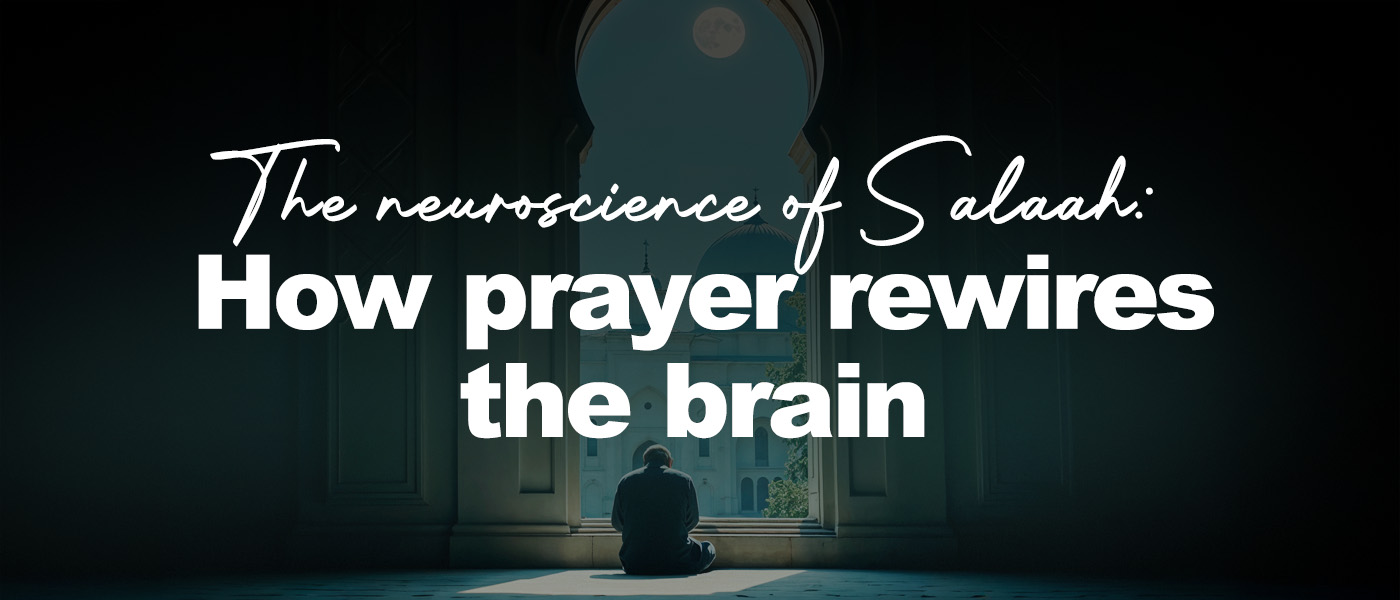
Have you ever had that moment in your life when everything around you feels super overwhelming, and everything that you thought you had under control suddenly feels so chaotic and disorganized? For example, you find that suddenly deadlines are piling up at work or school, you have an influx of messages that you have to get back to, your space is filled with so many responsibilities that have piled up out of nowhere and suddenly, your chest feels so hollow. It feels like the walls are closing in on you, like it’s becoming harder to breathe, you’re trying to make sense of it all only to become even more overwhelmed. All you want in that moment, all your mind wants in that moment is to seek stillness, silence, and tranquility not just to escape for however long, but to realign yourself once again so you can easily tackle your goals and get back on track.
All of a sudden, you hear the loud call of “Allahu Akbar.” Despite the dark cloud looming above your head you rise, perform ablution, adorn yourself in modest clothing, lay out the prayer mat and stand. Then you bow. You let your knees hit the ground to prostrate before your Lord in sheer devotion. With that one sajda, you’ve reminded yourself once again that such trivial matters and difficulties are to be left to Allah (SWT) so your difficulties may be eased. And that you are in this world for an hour, metaphorically speaking, and your end goal is to always re-center yourself with your Creator when He (SWT) commands your attention.
While this is a spiritual act, there are neurological and biochemical elements to your salaah as well that are not often discussed. When you perform the actions of prayer, you activate networks in your brain that are associated with peace, gratitude, and self-awareness. You physically re-shared the architecture of your mind and quite literally rewired your brain in the five minutes you took to silence every single thing happening around you.
In recent decades, neuroscience has made remarkable strides in uncovering how consistent behaviors influence the structure and function of the human brain – a phenomenon known as neuroplasticity. Practices like meditation, mindfulness, and breath-focused rituals have been shown to regulate stress, enhance emotional control, and even change the size and connectivity of various brain regions. For over 14 centuries, though, Islamic tradition has emphasized the transformative power of Salaah. Our obligatory prayers are a safeguard for the soul and a regulator of conduct. Salaah occupies a central role in the life of a practicing Muslim.
Allah (SWT) says in The Quran, “Recite what has been revealed to you of The Book and establish prayer. Indeed, genuine prayer should deter one from indecency and wickedness. The remembrance of Allah is an even greater deterrent. And Allah fully knows what you all do.” (The Clear Quran®, 29:45)

This Quranic verse highlights the tangible effect of prayer on human behavior, which is a concept now supported by growing scientific literature on how structured spiritual practices impact the brain’s emotional and moral regulation systems.
This article explores the intersection of Islamic prayer and neuroscience, addressing how the design and repetition of Salaah not only align with, but may actively facilitate, measurable improvements in brain health and mental well-being.
Neuroplasticity is the brain’s ability to rewire through repetition
One of the most significant discoveries in neuroscience is neuroplasticity: the brain’s ability to change its structure and function through experience and repeated behavior. In studies on long-term meditators and religious practitioners, researchers have observed that repeated engagement in focused, intentional practices leads to:
- Increased gray matter in regions associated with self-regulation, attention, and compassion.
- Strengthened neural pathways related to emotional resilience.
- Reduced activity in areas responsible for rumination and stress responses.
A study published in Psychiatry Research: Neuroimaging in 2011, found that individuals who engaged in regular mindfulness practice for just eight weeks showed increased critical thickness in the hippocampus (the area of the brain responsible for memory and learning), and decreased volume in the amygdala (the area of the brain responsible for stress and fear). Islamic prayer, performed consistently five times a day with structured recitations, postures, and moments of reflection, is a deeply embodied practice that fulfills many of the same conditions used in neuroscientific studies on mindfulness, including focused attention, intentional breathing, and physical stillness.

This positions Salaah as a natural spiritual modality for harnessing neuroplasticity.
Prefrontal cortex aviation enhances focus and self-control
The prefrontal cortex (PFC) is the executive center of the brain where it governs decision-making, attention regulation, self-control, and moral judgment. Strengthening this region is key to developing discipline and emotional maturity. Research published in the Journal of Cognitive Enhancement in 2020, showed that individuals engaged in structured contemplative practices had increased PFC activity, correlating with better impulse control and reduced emotional reactivity.
The daily act of turning away from worldly distractions to focus on Allah (SWT) requires cognitive inhibition, activating the PFC. Reciting Quranic verses, focusing on their meaning, and maintaining proper sequence in physical movements engage working memory and sustained attention. The required concentration (khushu) in prayer encouraged a neurological state of “top-down control,” counteracting reactive emotional patterns. The Prophet Muhammad (SAW) was described as maintaining deep composure and attention during prayer. In his Sunnah, even minor distractions were addressed with care and gentleness, emphasizing mental discipline.
The amygdala regulates emotional stress and fear
The amygdala plays a central role in processing emotions such as fear, anxiety, and aggression. Overactivation of the amygdala is associated with chronic stress, panic disorders, and negative emotional bias. A 2019 fMRI study published in NeuroReport assessed Muslim participants during sujood and found that the posture of prostration was associated with decreased amygdala activation and increased feelings of safety and grounding.

In multiple ahadith, the Prophet (SAW) encouraged prayer as a response to psychological distress. It is recorded that, “Whenever something distressed the Prophet, he (SAW) would turn to prayer.” (Abu Dawood)

This reflects the biological calming that prayer can induce. The physical posture of sujood, combined with intentional breathing and sense of surrender to a higher power, engages the parasympathetic nervous system, bringing the body into a state of rest and reduced stress.
Default Mode Network (DMN) counters rumination and overthinking
The Default Mode Network (DMN) is a set of interconnected brain regions that become active when we are not focused on the outside world, particularly during daydreaming, mind-wandering, or self-referential thinking. Overactivity in the DMN is linked to rumination, depression, and chronic anxiety. In a study published in Nature Reviews Neuroscience in 2015, researchers found that individuals engaged in structured spiritual practices showed reduced DMN activity, especially during focused prayer or meditation.
The structured repetition of dhikr, Quranic recitation, and physical movement shifts the brain’s focus away from self-centered narratives and toward a God-centered awareness. The rhythm and intentionality of Salaah anchor attention, helping to quiet the internal chatter associated with stress and emotional fatigue. In The Quran, Allah (SWT) says, “Surely in the remembrance of Allah do hearts find comfort.” (The Clear Quran®, 13:28)

This verse emphasizes a psychological reality confirmed by neuroscience: focused remembrance (i.e. dhikr) reduces mental turbulence and brings internal peace.
Emotional regulation and gratitude pathways
Consistent prayer activates brain regions linked to empathy, gratitude, and contentment, notably the anterior cingulate cortex and insula, both of which are involved in emotional self-awareness and interpersonal connection. A 2016 paper in Social Cognitive and Affective Neuroscience found that religious and spiritual practices increase activation in these regions, enhancing emotional regulation and pro-social behavior.
Each unit of prayer ends with tashahhud which is invoking peace upon the Prophet (SAW) and the righteous. The conclusion of every prayer includes salutations and often dua, practices that nurture both empathy and gratitude. In the hadith, gratitude, when practiced regularly, not only elevates spiritual rank but also improves dopamine and serotonin regulation, which are brain chemicals essential for mood and emotional well-being.
Salaah is a holistic system for mental and neurological health
When examined through the lens of neuroscience, Salaah emerges not only as an act of worship but as a comprehensive system for mental regulation, emotional healing, and cognitive resilience. The structure of Salaah combines:
- Physical movement
- Focused recitation
- Intentional breathing
- Emotional reflection
- Spiritual surrender
All of these correspond closely with what modern neuroscience identifies as essential practices for a balanced and healthy brain. The five daily prayers serve as interventions, spiritual and neurological, strategically placed throughout the day to rest, reframe, and realign the believer. Allah (SWT) says in Surah Taha, “It is truly I. I am Allah! There is no god worthy of worship except Me. So worship Me alone, and establish prayer for My remembrance.” (The Clear Quran®, 20:14)

This remembrance is not only metaphysical, but also mental, emotional, and embodied. It is part of what makes the human being resilient, focused, and spiritually anchored. As modern science continues to uncover the links between behavior and brain plasticity, it only strengthens what was already revealed: that Allah (SWT), in His Wisdom, designed Salaah not only for the soul, but also for the very system that carries it.
Dua
O Allah, the Most Merciful, the Most Majestic,
You are the One who hears the whispers of our hearts and sees the sincerity in our actions. We come to You in humility, asking for Your help in perfecting our Salaah.
O Allah, make our prayers a source of peace and strength. Let each bow and prostration bring us closer to You. Remove from our hearts all distractions, and fill them with khushu – with awe, presence, and love for You.
Help us stand before You not out of habit, but out of longing. Let our tongues recite Your words with clarity, our limbs move with devotion, and our hearts beat with remembrance of You.
O Allah, make our Salaah a shield from sin, a light in darkness, and a bridge to Jannah. Let it be the comfort of our souls and the anchor of our days.
Accept our prayers, even when they fall short. Forgive our forgetfulness, and guide us to the prayer of those You love – those whose hearts tremble in Your presence and whose eyes weep from Your mercy.
O Allah, grant us consistency, sincerity, and excellence in our worship. Make our Salaah a means of healing, of guidance, and of nearness to You.
Ameen!



